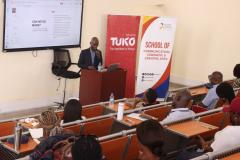Quick Tips for Writing a Job Application
By Justice Masima, Career Peer Advisor
Almost every job requires strong communication skills. It is important in getting and keeping a job. When looking for a job or internship, you will need to demonstrate your communication skills by how well you write the application letter and CV. Once you get a job or internship, you will need to write even more to communicate with your clients and colleagues.
Without strong writing skills, your applications may not create the right appeal to a potential employer.
Here are some tips to help you practice proper written communication.
1. Use short sentences
There is nothing wrong with short sentences. They are much clearer than longer sentences. Clarity should always be your goal when writing. Short sentences also give you more control over language. Lengthy sentences can accumulate and cloud the meaning of the sentence.
2. Avoid irrelevant words
Don’t use big irrelevant words as it creates a barrier between you and your readers. They will tune out trying to figure out what you meant. That is not a situation you would like to put in a prospective employer. Examples of commonly overused words that also take up time include indeed, in fact, therefore, and moreover. These words are called logical indicators. Using them does not make your writing better. Consider the following examples.
“Michael loves the color blue. In fact, all of his clothing is blue.”
Now consider these two without the indicator
“Michael loves the color blue. All of his clothing is blue.”
It’s obvious which two sentences are shorter, clearer and sound stronger
3. Read your writing aloud
There is a difference between reading aloud and reading in your head. Your ears can pick up things your eyes can’t. Before you send any writing to its readers, use your ear advantage by reading it aloud. When you read aloud you’ll be able to edit your writing as it begins to sound strange.
4. Spend enough time editing your writing
No one writes perfect first drafts. Good writing is a result of good editing. When you’re editing, the rhythm might change as word combinations that sounded fine might not anymore. Your career will benefit when you examine every word. So edit for rhythm, clarity, and brevity.





